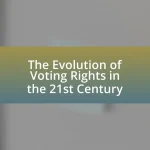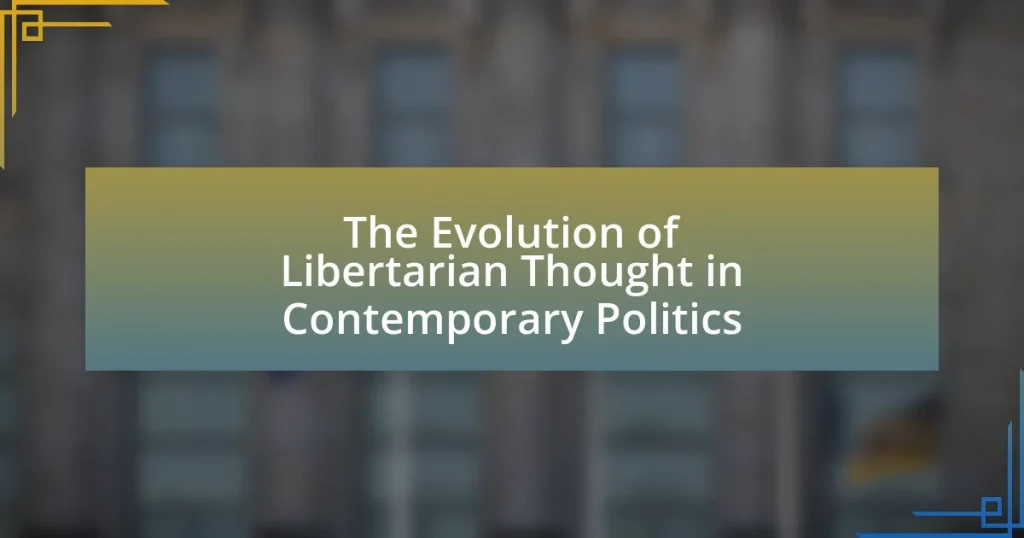The article examines the evolution of libertarian thought in contemporary politics, highlighting its transition from classical liberalism to a distinct political identity centered on individual liberty, minimal government, and free markets. It discusses the influence of key figures and organizations, such as Ron Paul and the Cato Institute, in popularizing libertarian principles, particularly in response to government intervention during events like the 2008 financial crisis. The article also explores how libertarian ideas have adapted over the decades to incorporate social justice and environmental concerns, the historical events that shaped these ideas, and the role of libertarian candidates and organizations in the current political landscape. Additionally, it addresses criticisms of libertarianism, including its perceived neglect of social inequalities and public goods, and outlines the strategies libertarians use to influence policy and public opinion.
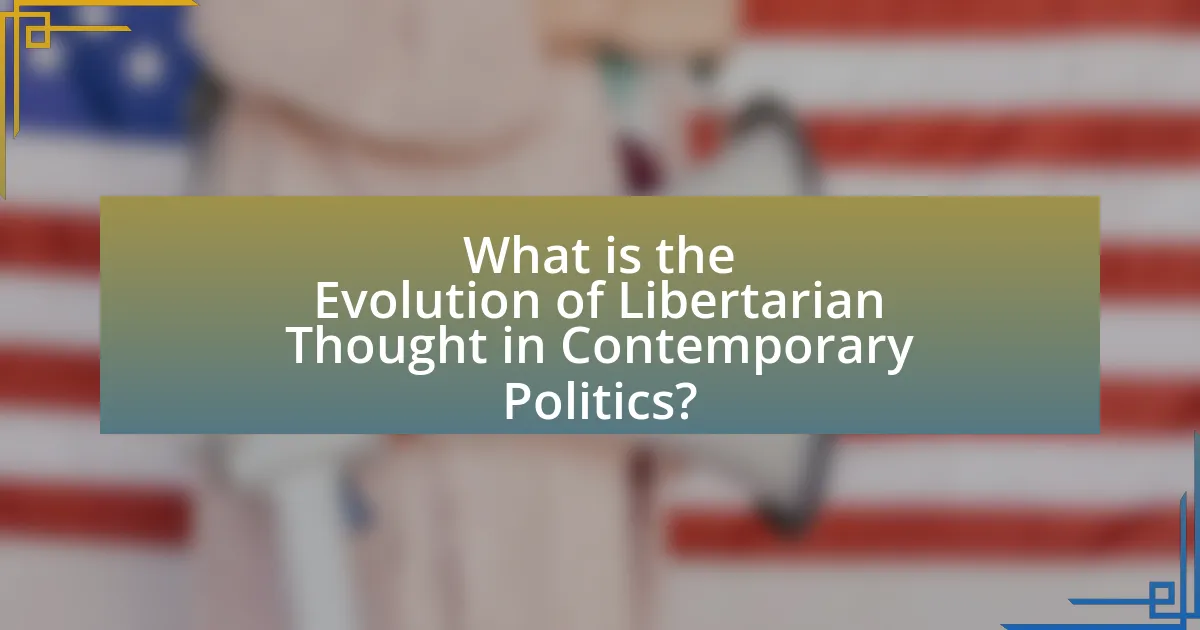
What is the Evolution of Libertarian Thought in Contemporary Politics?
The evolution of libertarian thought in contemporary politics reflects a shift from classical liberalism to a more distinct political identity emphasizing individual liberty, minimal government, and free markets. In the late 20th century, figures like Ron Paul and organizations such as the Cato Institute popularized libertarian principles, advocating for reduced government intervention in both personal and economic matters. The rise of the internet and social media has further facilitated the spread of libertarian ideas, allowing for grassroots movements and increased visibility of libertarian candidates. Additionally, the 2008 financial crisis and subsequent government bailouts intensified critiques of state intervention, leading to a resurgence in libertarian advocacy for fiscal responsibility and personal freedom. This evolution is evidenced by the increasing presence of libertarian candidates in elections and the growing acceptance of libertarian policies within broader political discourse.
How has libertarian thought changed over the decades?
Libertarian thought has evolved significantly over the decades, shifting from a primarily philosophical focus on individual liberty and minimal government to a more pragmatic approach that incorporates issues like social justice and environmental concerns. In the 1960s and 1970s, libertarianism was largely defined by its opposition to state intervention and its advocacy for free markets, as seen in the works of thinkers like Milton Friedman and Robert Nozick. However, by the 1990s and 2000s, the movement began to embrace a broader range of social issues, with figures like Ron Paul and Gary Johnson advocating for civil liberties, drug decriminalization, and non-interventionist foreign policies. This shift reflects a growing recognition that personal freedom extends beyond economic issues to encompass social and cultural dimensions, as evidenced by the increasing support for LGBTQ+ rights and criminal justice reform within libertarian circles.
What historical events influenced the development of libertarian ideas?
The development of libertarian ideas was significantly influenced by the Enlightenment, the American Revolution, and the Industrial Revolution. The Enlightenment, particularly the works of philosophers like John Locke and Adam Smith, emphasized individual rights and limited government, laying the intellectual groundwork for libertarian thought. The American Revolution (1775-1783) further propelled these ideas by establishing a nation based on principles of liberty and self-governance, as articulated in foundational documents like the Declaration of Independence. Additionally, the Industrial Revolution (late 18th to early 19th century) fostered economic freedom and individual entrepreneurship, reinforcing the libertarian belief in minimal state intervention in economic affairs. These historical events collectively shaped the core tenets of libertarianism, advocating for personal liberty, free markets, and limited government.
How have key libertarian thinkers shaped contemporary political discourse?
Key libertarian thinkers have significantly shaped contemporary political discourse by advocating for individual liberty, limited government, and free markets. Figures such as Friedrich Hayek and Milton Friedman have influenced economic policies by emphasizing the importance of personal choice and the dangers of government intervention, which has led to a resurgence of interest in free-market principles in various political arenas. Additionally, thinkers like Robert Nozick and Ayn Rand have contributed to discussions on ethics and morality in politics, promoting the idea that individual rights should be paramount. Their works have inspired movements such as the Tea Party and the Libertarian Party, which have pushed for reduced government spending and deregulation, thereby altering the landscape of political debate in the United States and beyond.
What are the core principles of libertarian thought?
The core principles of libertarian thought include individual liberty, limited government, free markets, and non-aggression. Individual liberty emphasizes the right of individuals to make choices about their own lives without interference. Limited government advocates for a minimal state that exists primarily to protect individual rights, rather than to regulate personal behavior or economic activity. Free markets promote voluntary exchange and competition as the best means to achieve prosperity and innovation. Non-aggression asserts that the initiation of force against others is inherently wrong, advocating for peaceful resolution of conflicts. These principles are foundational to libertarian ideology and have influenced contemporary political discourse, particularly in debates surrounding personal freedom and economic policy.
What role does individual liberty play in libertarian philosophy?
Individual liberty is central to libertarian philosophy, serving as the foundational principle that prioritizes personal freedom and autonomy over state control. Libertarians argue that individuals possess the right to make choices regarding their own lives, as long as those choices do not infringe upon the rights of others. This emphasis on individual liberty is rooted in classical liberal thought, which posits that a free society is one where individuals can pursue their own interests without coercion. Historical figures such as John Locke and more contemporary thinkers like Robert Nozick have reinforced this idea, advocating for minimal government intervention and the protection of personal freedoms as essential for a just society.
How does libertarianism view the role of government?
Libertarianism views the role of government as minimal, advocating for a limited state that primarily exists to protect individual rights, maintain order, and provide national defense. This perspective is rooted in the belief that government intervention in personal and economic matters infringes on individual freedoms and autonomy. Libertarians argue that a free market and voluntary interactions among individuals lead to better outcomes than government regulation. Historical context supports this view, as seen in the writings of key figures like John Locke and more contemporary libertarians such as Milton Friedman, who emphasized the importance of personal liberty and economic freedom.
Why is libertarian thought relevant in today’s political landscape?
Libertarian thought is relevant in today’s political landscape because it emphasizes individual liberty, limited government, and free markets, which resonate with growing public discontent towards government overreach and economic intervention. This relevance is evidenced by the increasing popularity of libertarian candidates and policies, such as the rise of the Libertarian Party in the United States, which garnered over 1.8 million votes in the 2020 presidential election, reflecting a significant voter base seeking alternatives to traditional political ideologies. Additionally, libertarian principles have influenced mainstream political discourse, particularly in debates surrounding personal freedoms, privacy rights, and economic deregulation, highlighting their impact on contemporary governance and policy-making.
What contemporary issues are influenced by libertarian principles?
Contemporary issues influenced by libertarian principles include drug legalization, privacy rights, and economic deregulation. Drug legalization is supported by libertarians who argue for personal choice and reduced government intervention, as seen in states like Colorado and California, where marijuana has been legalized for recreational use. Privacy rights are emphasized through opposition to mass surveillance and government overreach, highlighted by movements advocating for data protection and digital privacy, such as the Electronic Frontier Foundation. Economic deregulation is promoted to enhance free market competition, with examples including the push for reducing regulations on small businesses and the gig economy, which has gained traction in discussions around labor laws and entrepreneurship.
How do libertarian ideas intersect with other political ideologies?
Libertarian ideas intersect with other political ideologies primarily through their shared emphasis on individual liberty and limited government. For instance, libertarianism aligns with classical liberalism in advocating for personal freedoms and free markets, while also intersecting with elements of conservatism that prioritize economic freedom. Additionally, libertarian principles can resonate with progressive movements that focus on civil liberties, such as drug decriminalization and criminal justice reform. Historical examples include the collaboration between libertarians and progressives on issues like the legalization of marijuana, demonstrating a practical intersection of ideologies. This convergence highlights how libertarian thought can influence and be influenced by various political perspectives, fostering a broader dialogue on governance and personal rights.
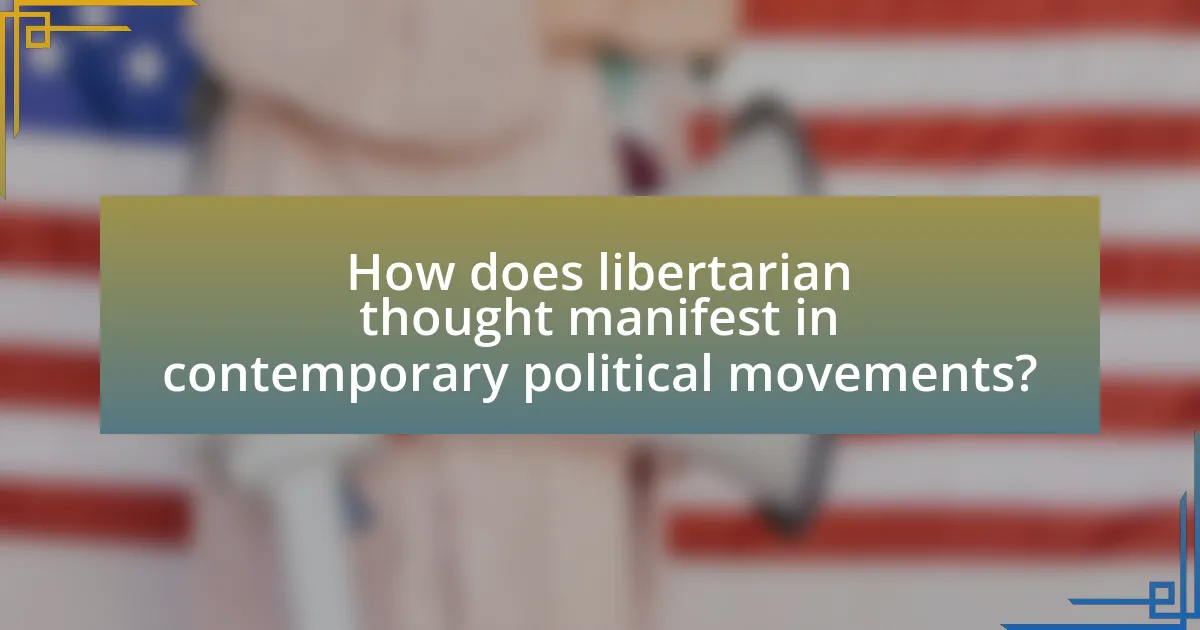
How does libertarian thought manifest in contemporary political movements?
Libertarian thought manifests in contemporary political movements primarily through advocacy for individual liberties, limited government, and free markets. This is evident in movements such as the Tea Party and the Libertarian Party, which emphasize reducing government intervention in both personal and economic affairs. For instance, the Tea Party emerged in the United States around 2009, promoting fiscal conservatism and a strict interpretation of the Constitution, aligning closely with libertarian principles. Additionally, the Libertarian Party, which has been active since 1971, consistently campaigns for policies that reduce state power, such as drug decriminalization and non-interventionist foreign policy. These movements reflect a growing public interest in libertarian ideas, as evidenced by increasing voter support for candidates who prioritize personal freedom and economic autonomy.
What political parties or organizations promote libertarian ideas today?
The Libertarian Party is the primary political party promoting libertarian ideas today, advocating for individual liberty, limited government, and free markets. Founded in 1971, it has consistently emphasized personal freedom and non-interventionist foreign policy. Additionally, organizations such as the Cato Institute and the Reason Foundation actively promote libertarian principles through research, advocacy, and public education. These entities contribute to the broader libertarian movement by influencing policy discussions and public opinion on issues like taxation, civil liberties, and government regulation.
How do these organizations differ in their interpretation of libertarianism?
Organizations such as the Cato Institute and the Libertarian Party differ in their interpretation of libertarianism primarily in their approaches to government involvement and social issues. The Cato Institute advocates for a more pragmatic approach, emphasizing limited government intervention in economic matters while supporting some social freedoms, such as drug decriminalization and same-sex marriage. In contrast, the Libertarian Party adheres to a strict non-interventionist stance, promoting a minimal state and opposing any form of government regulation, including on social issues. This divergence reflects broader ideological differences within the libertarian movement, where some prioritize economic liberty over social issues, while others view both as equally essential.
What strategies do they use to influence policy and public opinion?
Libertarians influence policy and public opinion primarily through grassroots activism, strategic use of social media, and targeted lobbying efforts. Grassroots activism involves mobilizing supporters to engage in local and national campaigns, which has been effective in raising awareness about issues like individual liberties and government overreach. For instance, organizations such as the Cato Institute and the Reason Foundation actively promote libertarian principles through public events and educational programs.
Social media serves as a powerful tool for libertarians to disseminate their ideas quickly and engage with a broader audience, exemplified by the use of platforms like Twitter and Facebook to share content that challenges mainstream narratives. Additionally, targeted lobbying efforts focus on influencing legislators directly, often employing data-driven arguments to advocate for policy changes that align with libertarian values, such as reducing government regulation and promoting free markets.
These strategies have been validated by the increasing visibility of libertarian candidates in elections and the growing public discourse surrounding libertarian principles, indicating their effectiveness in shaping policy and public opinion.
What role do libertarian candidates play in elections?
Libertarian candidates play a significant role in elections by promoting individual liberties, limited government, and free-market principles. They often influence the political discourse by introducing alternative viewpoints that challenge the status quo of major party platforms. For instance, in the 2016 U.S. presidential election, Libertarian candidate Gary Johnson received over 4 million votes, which accounted for approximately 3.3% of the total vote, demonstrating their potential to sway outcomes in closely contested races. This presence can lead to shifts in policy discussions, encouraging mainstream candidates to address issues such as personal freedom, government overreach, and fiscal responsibility.
How successful have libertarian candidates been in recent elections?
Libertarian candidates have had limited success in recent elections, often struggling to secure significant electoral victories. For instance, in the 2020 U.S. presidential election, the Libertarian Party candidate, Jo Jorgensen, received approximately 1.2% of the popular vote, which is consistent with the party’s historical performance of garnering around 1% to 3% in presidential elections since the 1990s. Additionally, in various state and local elections, while some libertarian candidates have won seats, they typically do not achieve major offices, reflecting the challenges they face in a predominantly two-party system.
What challenges do they face in a predominantly two-party system?
Libertarians face significant challenges in a predominantly two-party system, primarily due to systemic barriers that limit their electoral viability. These barriers include restrictive ballot access laws, which often require third-party candidates to gather a substantial number of signatures to qualify for elections, making it difficult for libertarians to compete. Additionally, the winner-takes-all electoral system discourages voters from supporting libertarian candidates, as they may perceive them as unlikely to win, leading to a lack of funding and media coverage compared to the major parties. Historical data shows that in the 2020 U.S. presidential election, the Libertarian Party received only 1.2% of the vote, highlighting the struggle for visibility and influence in a landscape dominated by the Democratic and Republican parties.
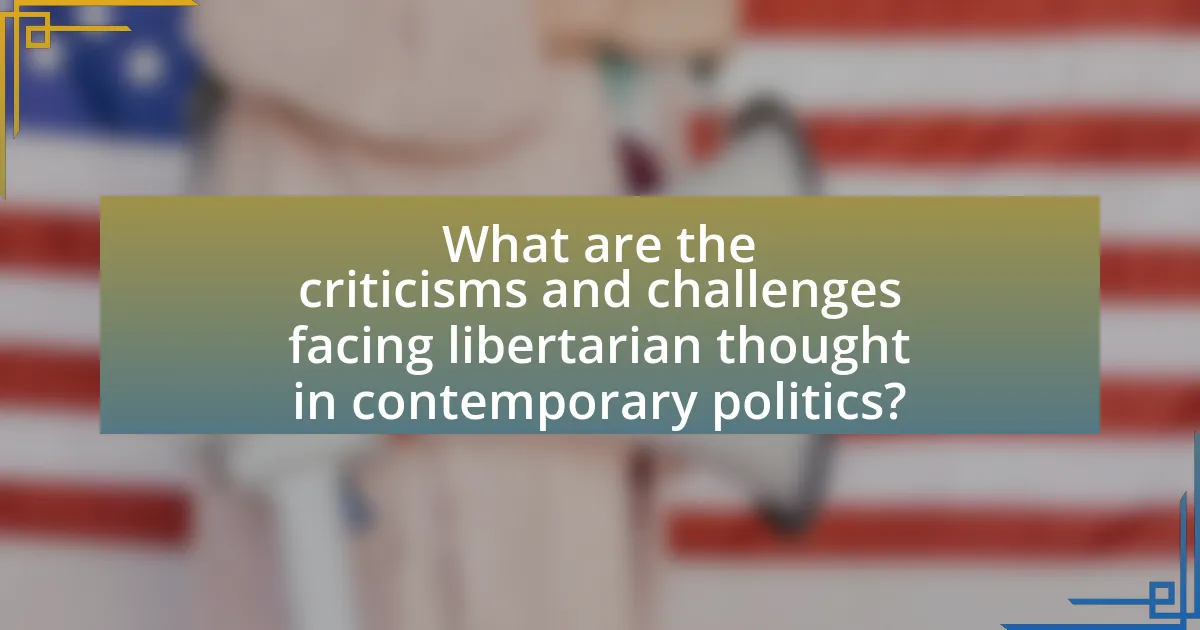
What are the criticisms and challenges facing libertarian thought in contemporary politics?
Libertarian thought faces significant criticisms and challenges in contemporary politics, primarily centered around its perceived inadequacy in addressing social inequalities and public goods. Critics argue that libertarianism’s emphasis on individual freedom and minimal government intervention can lead to neglect of essential services such as healthcare and education, which are often viewed as public goods that require collective funding and management. For instance, studies indicate that countries with stronger social safety nets tend to have better health outcomes and lower poverty rates, suggesting that libertarian policies may exacerbate existing inequalities. Additionally, libertarians are often challenged on their stance regarding regulation, particularly in areas like environmental protection and consumer safety, where a lack of oversight can result in significant harm to society. These criticisms highlight the ongoing debate about the balance between individual liberty and the role of government in ensuring equitable access to resources and protection for all citizens.
What are the main criticisms of libertarianism?
The main criticisms of libertarianism include its perceived neglect of social justice, the potential for economic inequality, and the underestimation of the role of government in providing public goods. Critics argue that libertarianism prioritizes individual freedom to the detriment of collective welfare, leading to a society where marginalized groups may suffer due to lack of support systems. Additionally, economic inequality can arise when market forces are left unchecked, as evidenced by rising wealth disparities in countries with minimal government intervention. Furthermore, opponents contend that libertarianism fails to recognize the necessity of government in areas such as infrastructure, education, and healthcare, which are essential for a functioning society.
How do critics argue against the feasibility of libertarian policies?
Critics argue against the feasibility of libertarian policies by highlighting their potential to exacerbate social inequalities and undermine public goods. For instance, opponents assert that a minimal state may fail to provide essential services such as education and healthcare, leading to a reliance on private markets that can disadvantage low-income individuals. Research from the Economic Policy Institute indicates that income inequality has risen significantly in countries with less government intervention, suggesting that libertarian policies may not effectively address the needs of all citizens. Additionally, critics point to historical examples, such as the deregulation of the financial sector prior to the 2008 financial crisis, which demonstrate that reduced government oversight can lead to systemic risks and economic instability.
What ethical concerns are raised regarding libertarian principles?
Libertarian principles raise ethical concerns primarily related to social justice and inequality. Critics argue that a strict adherence to individual liberty can lead to the neglect of collective responsibilities, resulting in systemic inequalities that disproportionately affect marginalized groups. For instance, the libertarian emphasis on minimal government intervention may undermine social safety nets, which are essential for supporting vulnerable populations. This perspective is supported by research indicating that countries with lower levels of government intervention often experience higher rates of poverty and inequality, as seen in various economic studies. Additionally, the prioritization of personal freedom can conflict with the ethical obligation to ensure equitable access to resources and opportunities for all individuals, raising questions about the moral implications of prioritizing individual rights over collective welfare.
How do libertarians respond to these criticisms?
Libertarians respond to criticisms by emphasizing individual liberty, personal responsibility, and the belief that free markets lead to better outcomes. They argue that government intervention often creates more problems than it solves, citing examples such as the inefficiencies of welfare programs and the negative consequences of excessive regulation. Libertarians also point to historical instances where reduced government involvement has resulted in economic growth and increased personal freedoms, such as the deregulation of industries in the 1980s, which they claim led to innovation and job creation. Additionally, they assert that voluntary interactions in a free market foster cooperation and mutual benefit, countering claims that libertarianism neglects social welfare.
What arguments do libertarians use to defend their philosophy?
Libertarians defend their philosophy primarily through the principles of individual liberty, limited government, and free markets. They argue that individual liberty is a fundamental human right, asserting that people should have the freedom to make choices about their own lives as long as they do not infringe on the rights of others. This belief is rooted in the idea that personal autonomy leads to greater happiness and innovation.
Additionally, libertarians advocate for limited government, claiming that a smaller government reduces the risk of tyranny and promotes personal responsibility. They argue that government intervention often leads to inefficiencies and unintended consequences, citing historical examples such as the Great Depression, where excessive regulation is believed to have exacerbated economic downturns.
Furthermore, libertarians emphasize the importance of free markets, arguing that voluntary exchanges lead to better outcomes than government-controlled economies. They reference the success of capitalist economies in promoting prosperity and innovation, contrasting them with the failures of centrally planned economies, such as those seen in the Soviet Union.
These arguments are supported by various studies and historical evidence, demonstrating that societies with higher levels of personal freedom and economic liberty tend to experience greater overall well-being and economic growth.
How do libertarians adapt their ideas in response to contemporary challenges?
Libertarians adapt their ideas in response to contemporary challenges by emphasizing individual freedom, personal responsibility, and limited government intervention. For instance, in the face of increasing government surveillance and data privacy concerns, libertarians advocate for stronger protections of personal data and oppose mass surveillance practices. This adaptation is evident in the rise of organizations like the Electronic Frontier Foundation, which promotes digital rights and civil liberties. Additionally, libertarians address economic challenges by supporting free-market solutions and opposing excessive regulation, arguing that deregulation fosters innovation and economic growth. This approach is supported by historical evidence showing that countries with lower regulatory burdens often experience higher economic performance.
What practical steps can individuals take to engage with libertarian thought?
Individuals can engage with libertarian thought by reading foundational texts such as “Atlas Shrugged” by Ayn Rand and “The Road to Serfdom” by Friedrich Hayek, which articulate key libertarian principles. Additionally, participating in local libertarian meetups or events allows for direct interaction with like-minded individuals and discussions on current political issues. Joining organizations like the Cato Institute or the Libertarian Party provides access to resources, educational materials, and networking opportunities that further deepen understanding of libertarian philosophy. Engaging in online forums and social media groups dedicated to libertarianism also facilitates ongoing dialogue and exposure to diverse perspectives within the movement. These steps collectively enhance comprehension and active participation in libertarian discourse.
How can one become involved in libertarian organizations or movements?
To become involved in libertarian organizations or movements, individuals can start by researching local and national libertarian groups, such as the Libertarian Party or the Cato Institute. Engaging with these organizations often involves attending meetings, participating in events, and volunteering for campaigns or initiatives. For instance, the Libertarian Party has local chapters that host events and provide opportunities for activism. Additionally, individuals can join online forums and social media groups dedicated to libertarian principles, which facilitate discussions and networking with like-minded individuals. This approach is supported by the growth of libertarian activism, which has seen increased participation in grassroots movements and educational outreach, reflecting a rising interest in libertarian ideas in contemporary politics.
What resources are available for learning more about libertarian principles?
Books, online courses, and websites are key resources for learning about libertarian principles. Notable books include “Atlas Shrugged” by Ayn Rand, which explores individualism and capitalism, and “The Law” by Frédéric Bastiat, which discusses the role of law in society. Online platforms like the Cato Institute and the Mises Institute offer extensive articles, research papers, and educational resources on libertarian thought. Additionally, courses from universities and organizations such as the Libertarian Party provide structured learning opportunities. These resources collectively offer a comprehensive understanding of libertarian principles and their application in contemporary politics.




